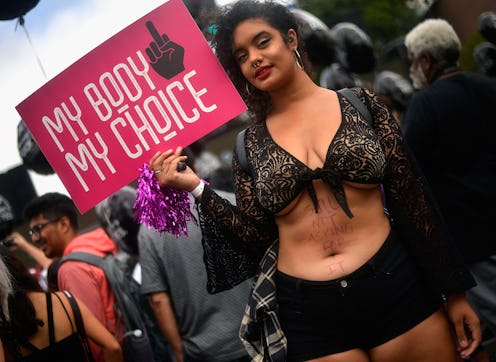Life
A New Study Shows People Feel Less Empathy Towards Women Who Wear “Revealing” Clothes

It is not unusual for sexual assault survivors to be slut-shamed or judged for what they were wearing if they choose to disclose their assault. Even women who have not experienced assault have their appearances are scrutinized at every turn — their clothing choices used to judge everything from their intelligence to their sexual promiscuity (or lack thereof). Now, science has determined that our brains react differently to women depending on their clothing choices, though researchers are not sure exactly why this is the case. People feel less empathy towards women who wear more revealing clothing, according to a new study, but the findings can come as a reminder that everyone can be conscious of this bias and work to check it.
In order to come to this conclusion, the researchers had study participants play a cyber game where they tossed a ball to different actors: "sexualized" women (in a dress, high heels, and heavy makeup), “personalized” women (in jeans, a t-shirt, and light makeup), and themselves. The virtual ball-tossing game was used to elicit negative emotions by excluding the actors from the game at different points, and positive emotions by including them. The results revealed the study participants were far less likely to feel empathy for the sexualized woman when she was excluded from the ball-tossing game, and they felt less intense positive emotions when she was included.
Lead author Giorgia Silani tells Bustle that it's not determined yet if lack of empathy towards women dressed in "revealing" clothing is a direct result of pervasive social attitudes about women's clothing, but she adds that researchers "are planning new studies with the aim to understand which are the causes of this phenomenon." Silani and her colleagues explained in the study abstract, which was recently published in Cortex, that they conducted their research “in light of the gender-based violence that is afflicting the modern society,” and had theorized “that behind the tendency to act violently likely stands, among other factors, a dramatic dampening of the perpetrator's empathic feelings toward the victim of the violence.”
The researchers measured the brain activity of study participants, and found that fewer regions associated with empathy lit up when it came to the sexualized actor. "This reduction in empathic feelings towards sexually objectified women was accompanied by reduced activity in empathy related brain areas. This suggests that observers experienced a reduced capacity to share the sexualized women's emotions,” Silani explained in the press release.
Furthermore, the authors note in the study that “the emotional intensity reported [by study participants] for the self was the highest, followed by the personalized targets, and the objectified targets as the lowest.” Meaning, the participants were less likely to empathize and relate to the sexualized women — whether they were feeling positive emotions or negative emotions. However, when the researchers modified the clothing on the sexualized model and covered more skin, they found the participants became more empathetic. Silani tells Bustle it's important to note the study only "claims a reduction of empathy," and does not necessarily mean study participants didn't feel "compassion or sympathy" for the sexualized women.
The findings of the study could have serious implications IRL. According to statistics from the Rape, Abuse & Incest National Network (RAINN), an American is sexually assaulted every 98 seconds and one in six American women are victims of attempted or completed rape in her lifetime. Instead of being met with support, sexual assault survivors all too often experience victim-blaming — especially in regards to what she was wearing at the time of her assault. Even though women’s clothing has nothing to do with whether or not someone will be assaulted, what someone was wearing at the time of their assault is regularly questioned when weighing the supposed validity of assault survivors’ stories, and this study provides more insight into why lack of empathy may play a role in perpetuating rape culture and victim-blaming.
Let’s make this crystal clear: This study's finding don’t give anyone an excuse to argue women need to wear less “sexualized” clothing — it’s still everyone's responsibility to recognize this sexist bias, do better, and not objectify women who choose to openly express themselves sexually through their appearance. Silani tells Bustle that people can retrain their minds to be more empathetic towards women who choose to wear more revealing clothing, and that there is "already evidence of empathy changes towards [marginalized groups] after training."
Clothing choices are never a justification for violence committed against women. Luckily, survivors and activists alike have worked tirelessly to combat that pervasive but incorrect notion. The results of this study show our society still has a long way to go when it comes to unlearning our sexist beliefs and behaviors. Victim-blaming and slut-shaming are never okay, and the validity of a women’s experiences and feelings should not be determined by what she chooses to wear — or not to wear. A piece of clothing, or lack thereof, is never an excuse to dehumanize another person.